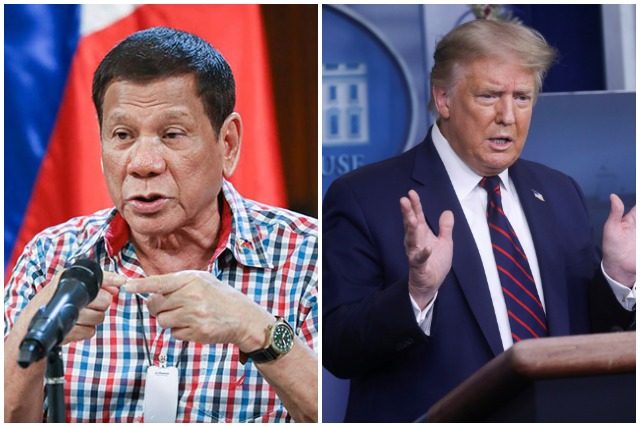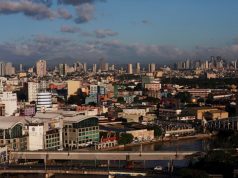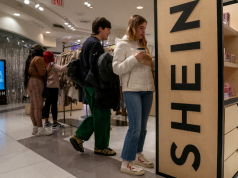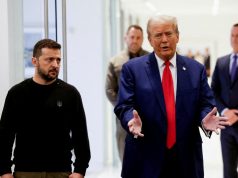
President Rodrigo Duterte‘s latest remarks about disinfecting face masks with “gasoline or diesel” were juxtaposed with that of his American counterpart who previously suggested injecting disinfectants to supposedly treat COVID-19.
The chief executive in his televised meeting with the Inter-Agency Task Force aired Tuesday erroneously advised the public to reuse face masks and soak it in gasoline or diesel if they cannot afford to spray it with alcohol or Lysol.
Duterte’s latest national address transcript reads:
“Ngayon, kung wala kayo, I will try to buy as many as I can afford kung kaya ko, ibigay namin iyan sa inyo libre but wear it, and maski na gamitin mo siguro iyan ng dalawang beses okay man lang kung i-sprayan mo lang ng alcohol pagkatapos.”
“Huwag iyong ini-i-spray mo at isuot mo kaagad. Iyong pagkatapos ng araw, hang it somewhere, i-sprayan mo lang ng Lysol if you can afford it. Iyong wala, ibabad mo ng gasolina o diesel, p****** i** COVID na ‘yan. Hindi uubra ‘yan diyan.”
“Totoo. Kung wala kayo—if you want to disinfect, maghanap ka ng gasolina. Ibabad mo lang iyong kamay mo. Layo mo lang kay baka—huwag sa loob ng bahay ninyo.”
The Department of Health, meanwhile, said that Duterte’s remarks could’ve been a “joke,” particularly the part on dousing face masks with gasoline.
“Dito naman sa sinabi ni President, he’s mentioning, really, the reusable na mga face mask katulad ng cloth mask. Alam niyo naman pag nagsasalita si Presidente, baka iyong mga jokes lang niya iyon, especially for gasoline,” DOH Undersecretary Maria Rosario Vergeire said on Wednesday.
She also reminded the public that only cloth face masks could be reused after proper washing while N95 and surgical face masks needed to be disposed of after single-use.
“Kung paano i-treat ang maduming bagay at infectious waste, ganun din ang pag-treat at pag-handle sa masks,” Vergeire added.
The World Health Organization noted that the surgical masks can only be worn once while cloth masks needed to be washed with soap or detergent, preferably in hot water, at least once a day.
Trump and disinfectants
Meanwhile, journalist Barnaby Lo pointed out that the DOH “should’ve flat out said no” in response to Duterte’s “gasoline” remarks.
He quoted a report of a digital news outlet that said: “Health Usec. Vergeire did not confirm whether gasoline or diesel is safe to use and instead said that DOH… is recommending handwashing and alcohol use.”
ABS-CBN entertainment reporter Miguel Dumaual tagged Duterte’s American counterpart, United States President Donald Trump, as he recalled the latter’s words about injecting disinfectants in a supposed bid to cure COVID-19.
Huy @realDonaldTrump diba sabi mo pweds mag inject ng disinfectant para kontra COVID? Sabi ni Tatay Digong namin ibabad sa diesel yung face mask para pweds magamit ulit. Pweds ba mag collab kayo ng anti-COVID tips tas puro tauhan niyo test subjects? For the greater good po
— Miguel Dumaual (@migueldumaual) July 22, 2020
Another Twitter user couldn’t help but make the comparison and even shared a screengrab of a foreign news magazine’s report about it.
Trump: Injecting Lysol
Duterte: Disinfection using gasolinepick your poison pic.twitter.com/p4aqzTxJvn
— Trix de la Vegá (@trixdelavega) July 22, 2020
“Gasoline is to Duterte as bleach is to Trump,” A Filipino tweeted with an eye roll emoji.
“Trump told Americans to drink bleach to kill the virus. Duterte told the Filipinos to wash their face masks with gasoline to reuse it. Do you see the common denominator?” a Twitter user wrote.
Another online user asked: “What’s with authoritarians and their stupid solutions?”
“The US has Trump with injecting disinfectants. We have Duterte with dousing masks with gasoline,” the Twitter user added.
Trump made the suggestion for researchers to explore the possibility of injecting a disinfectant into the body in April.
This was during a White House‘s coronavirus task force briefing when an official presented results of a government research that indicated the virus appeared to deteriorate more quickly when exposed to sunlight and heat.
“So, supposing we hit the body with a tremendous — whether it’s ultraviolet or just very powerful light — and I think you said that that hasn’t been checked, but you’re going to test it,” Trump was quoted by Vox as saying.
“And then I said, supposing you brought the light inside of the body, which you can do either through the skin or in some other way. And I think you said you’re going to test that too. Sounds interesting,” he continued.
Trump then mentioned “disinfectant” when the official responded that they’ll “get to the right folks who could” presumably do the tests the leader said.
“And then I see the disinfectant, where it knocks it out in a minute. One minute. And is there a way we can do something like that, by injection inside or almost a cleaning. Because you see it gets in the lungs and it does a tremendous number on the lungs. So it would be interesting to check that,” the US president said.
Medical doctors were quick to debunk Trump’s claims and warned the public that the consumption of disinfectants and such cleaning products could lead to death.
“It is unfortunate that I have to comment on this, but people should under no circumstances ingest or inject bleach or disinfectant,” American Medical Association President Patrice Harris said.
“Rest assured when we eventually find a treatment for or vaccine against COVID-19, it will not be in the cleaning supplies aisle,” she added.
Lysol manufacturers similarly issued a warning and said that its disinfectant products are not meant to be administered into the human body, specifically as a supposed treatment for COVID-19.
In March, Duterte claimed that COVID-19 has a “hard time” surviving in high temperatures.
“They said that itong coronang ito has a hard time surviving in a high temperature. So pagka gano’n, maybe that explains the reason why na hindi naman masyadong marami,” he said in a national address.
Trump in the same month likewise claimed heat can kill off the virus.
Experts, however, said that warmer weather may only reduce viral transmission but it is highly unlikely that the weather itself will end the pandemic.
“Weather alone cannot quench the epidemic in summer, even though it does help reduce the transmission rates to some extent,” study co-author Hazhir Rahmandad, an MIT associate professor of system dynamics, was quoted as saying by Voice of America in May.
RELATED: Will warmer weather stop the spread of coronavirus?









